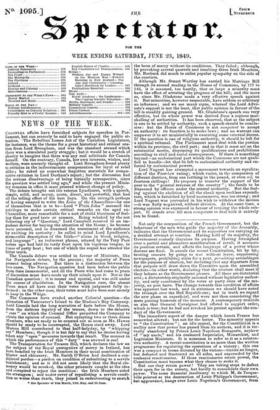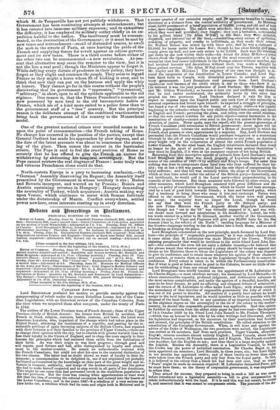Not only the composition of the French Government, but the
behaviour of the men who guide the majority of the Assembly, indicates that the Government and its supporters are carrying on a decided attempt at reaction. Having hold of its majority, the Government scarcely disguises its purpose. having triumphed over a partial and premature manifestation of revolt, it accounts its position certain, and affects the language of a power whose decrees are final. It annuls the recent Constitution, bit by bit; braving censure by going to war without leave, suppressing newspapers, prohibiting clubs for a year, permitting assemblages for the purpose of election, but declaring that any departure from that purpose will draw down the Executive upon the assembled electors—in other words, declaring that the electors shall meet if they behave as the Government pleases. All these are dictatorial acts ; a dictatorship originally assumed without legislative author- ity, and only sanctioned by the votes or party cries of the ma- jority, ex post facto. The change towards this condition of affairs was apparent last week, and in strictness we should have noted the triumph over the Red Republicans; but in truth we regard the new phase as superficial, and were not then considering the mere passing humours of the moment. A contemporary reminds us also that General Cavaignac had offered to support order, which is true; but he had not revoked his protest against the con- duct of the Government.
The immediate aspect of the danger which besets France has somewhat altered ; but not for the better. The minority appeals to " the Constitution " ; an idle appeal, for the Constitution is a nullity now that power has passed from its authors, and it is vir- tually abandoned by Prince Louis Napoleon Bonaparte, nephew of "my uncle," and his coalesced Imperialist, Monarchist, and Legitimist Ministers. It is nonsense to refer to it as a substan- tive authority. A recent constitution is no more than the written programme for regulating the operations of a victory ; this one was a compact in terms dictated by the victors—victors no longer, but defeated and frustrated on all aides, and superseded by the coalesced reactionaries. If those reactionaries retain power, the Constitution must become what they choose to make it.
But can they retain power ? They are taking steps to defeat their open foe in the streets, but hardly to consolidate their own power. The same financial insolvency to which M. de Tocque- ville pointed as the destruction of Louis Philippe's Government, but aggravated, hangs over Louis Napoleon's Government, from which M. de Tocqueville has not yet publicly withdrawn. That Government has been continuing attempts at retrenchment ;, but it has entered into immense military expenses; -and to extsperate. the difficulty, it has employed its military outlay chiefly in an ex- pedition hateful to the nation. The insolvency must be consum-_ mated, to the destructiorrof the Government ; or it must be met-by new taxes and retrenchment—recall of disbanded armies, to swell the mob in the streets of Paris, at once hurting the pride of the French and supplying forces for revolt against an odious govern- ment and its new taxes. There is a third course before-either of the other two can be consummated—a new revolution. - Alepre- sent that alternative may seem the moter to the view, but it is not the less a real peril ;, though the Ministers appear to forget it. While defying every dictate of prudence in their policy, they have forgot or they slight and contemn the people. They seem to regard France as they might a horse whose fit of kicking is, over, and to think that now they can put on the harness and -apply the whip at leisure. They.cannot go far in this course without the people's discOvering that its government is "oppressive," "tyrannical," "arbitrary," in short, open to all the epithets applicable to the old regimes. One reaaon is, that the Prince President's councils are -now possessed by men bred to the old bureaucratic habits of France, which are of a kind more suited to a police force than to the government staff of a " free " country. But the principal reason is the deliberate attempt of the combined reactionaries to .bring back the government of the country to the Monarchical model.



























